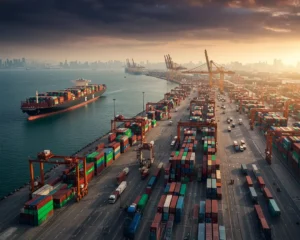Chicago Freight Logistics: Connecting Midwest Manufacturing to Canada
- ULS Freight

If you run a manufacturing business in the Midwest, you already know that production is only half the battle. The other half is getting your goods to market—on time, in good condition, and at a cost you can predict. For many companies in Illinois, Indiana, Ohio, and Michigan, that means one thing: moving freight through Chicago.
Chicago is where highways, railroads, and air routes converge to connect Midwest production with Canadian buyers. Every order you ship north—whether it’s auto parts to Ontario or food products to Quebec—likely passes through this city. And yet, for business leaders like you, Chicago logistics is less about geography and more about reliability. You want to know: will my shipment arrive when I promised my customer? Will border delays drain my margins? Can I trust my carrier when capacity gets tight?
Those are fair concerns. Because behind every statistic about Chicago being “the largest freight hub” are real decisions you face every day. Which route is fastest but still cost-efficient? How do you navigate customs paperwork without costly mistakes? And most importantly—how do you keep your Canadian customers happy while protecting your bottom line? This blog will walk you through those challenges and show you how the right logistics strategies make Chicago not just a transit point, but an advantage for your business.
Why Chicago Matters to Your Supply Chain
The first question you might ask is simple: why does everything seem to run through Chicago? The answer is infrastructure. Chicago sits at the crossroads of America’s busiest highways, six Class I railroads, and one of the country’s largest cargo airports. That makes it the natural launch point for freight bound for Canada. But while that scale offers opportunity, it also creates congestion and complexity.
For a manufacturer, this means choices. You could move shipments by truck through I-90 into Ontario, switch to rail for long-haul freight to western Canada, or even use O’Hare air cargo when speed is critical. Each option has trade-offs, and that’s where many business owners start feeling the weight of logistics decisions. Do you pay more for faster transit to keep a Canadian client happy? Or do you stretch delivery windows to keep costs down?
This is why many Midwest manufacturers lean on local Chicago logistics companies. These providers understand the bottlenecks and know how to navigate them—whether that means consolidating smaller shipments, scheduling around peak congestion, or leveraging intermodal terminals. In short, Chicago is both your challenge and your opportunity. And the way you approach it directly affects your ability to compete in the Canadian market.
Key considerations for your supply chain:
- Location gives you access but also exposes you to congestion.
- Multiple modes of transport are available, each with trade-offs.
- Local expertise can turn Chicago from a headache into a strategic advantage.
The Role of Freight in Midwest Manufacturing
If you manage a production line in the Midwest, you know how much your business depends on reliable logistics. You can’t afford idle machinery in Illinois or missed deliveries in Toronto because a truck was delayed at the border. The supply chain is only as strong as the freight network connecting you to your buyers, and Chicago is at the center of that connection.
Think about your products. Auto parts need to arrive in Ontario assembly plants daily or Canadian automakers face downtime. Agricultural goods must be kept fresh as they move north into retail distribution. Heavy machinery is time-sensitive because Canadian construction projects work on tight deadlines. Pharmaceuticals and healthcare products demand not just speed, but strict temperature control and regulatory compliance. Each of these industries faces unique challenges, but all share one concern: what happens if shipments don’t move through Chicago on schedule?
That’s why many manufacturers see freight not just as transportation, but as risk management. Every late shipment damages customer trust. Every compliance error at the border adds costs. And every missed delivery window puts future contracts at risk. For business leaders like you, the real question is not how to move goods—it’s how to make logistics reliable, cost-efficient, and scalable as your Canadian demand grows.
Points to consider:
- What’s the cost of downtime if your freight misses delivery?
- How sensitive are your shipments to temperature, handling, or timing?
Do your logistics partners offer scalability as you expand in Canada?
Cross-Border Freight: From Chicago to Canada
The next challenge is crossing the border. Getting freight out of Chicago is one thing; getting it into Canada on time is another. If you’ve ever dealt with customs delays, you know how frustrating it can be. A missing certificate of origin, an incorrect HS code, or a misfiled invoice can hold your cargo for days. For a Canadian customer waiting on parts, that delay isn’t just inconvenient—it could cost you the contract.
The main routes you’ll rely on are well-traveled. Chicago to Toronto is the busiest, with many loads completed in under two days. Chicago to Montreal supports Quebec’s industries and usually takes two to three days. For western Canada, intermodal rail often carries containers to Vancouver for onward distribution. Each route is proven, but they’re only as smooth as the documentation behind them. That’s why many businesses partner with freight companies that also provide customs brokerage. It means you don’t have to second-guess compliance details that could derail your delivery.
Another option worth considering is bonded carriers. These are providers licensed to move goods across the border without paying duties until final clearance. If you’re shipping high-value goods, bonded carriers protect your cash flow and keep freight moving faster. For many CFOs and supply chain managers, that’s not just a logistical benefit—it’s a financial strategy. Choosing the right carrier reduces delays and gives you confidence that your shipment will arrive on time and in full.
Key takeaways:
- Border compliance is as critical as transportation itself.
- Customs brokerage support removes the risk of shipment delays.
- Bonded carriers add speed and protect cash flow for high-value freight.
Choosing the Right Mode of Transport
Once you know your routes and compliance requirements, the next decision is how to ship. Every option has trade-offs, and as a business leader, you’re balancing speed, cost, and reliability with every shipment. That’s why it’s important to understand when to choose full truckload, less-than-truckload, intermodal, or air freight.
Full truckload (FTL) is often the fastest and most reliable option when you have large shipments. You’re paying for the whole truck, which means your goods move directly without extra stops. But if your loads are smaller, less-than-truckload (LTL) can be more cost-effective since you share space with other shippers. The trade-off is that transit times may be longer, and handling risks increase. Many Midwest manufacturers move between LTL and FTL depending on demand. The key is flexibility, and the right provider can help consolidate freight to optimize cost without sacrificing delivery windows.
For long-haul freight, especially to western Canada, intermodal rail is becoming more attractive. Containers move by train out of Chicago and connect seamlessly to trucking at destination points. It lowers costs, adds capacity when trucks are limited, and reduces environmental impact. Finally, when urgency outweighs everything else, air freight from O’Hare gives you next-day delivery to Toronto, Montreal, and Calgary. It’s not cheap, but for time-critical shipments like pharmaceuticals or electronics, it’s the difference between a satisfied customer and a lost order.
How to decide on transport modes:
- FTL: Best for large, high-value, or time-sensitive shipments.
- LTL: Ideal for smaller, recurring orders where cost control matters.
- Intermodal: Efficient for long-haul, containerized freight with lower costs.
- Air freight: Critical for urgent, high-value, or regulated shipments.
Challenges You’ll Face in Chicago Freight Logistics
Even with all of Chicago’s infrastructure, shipping isn’t without challenges. Business owners often describe freight logistics as a balancing act between predictability and risk. Border delays, traffic congestion, labor shortages, and winter weather are just a few of the realities you’ll face.
Border delays are a common concern. A single paperwork error can hold shipments for days. Congestion is another issue. Chicago’s highways and rail yards are some of the busiest in North America, which means your shipments compete with thousands of others every day. Then there’s the driver shortage, which has been a persistent challenge for Midwest trucking companies. These constraints drive up costs and reduce available capacity, especially during peak seasons.
Weather is the fourth challenge, and it can’t be overlooked. Harsh winters create unpredictable risks that can stall even the best-planned shipments. For you as a business owner, each of these challenges means one thing: potential disruption. The companies that succeed are those that plan ahead. They work with logistics partners who provide visibility, contingency plans, and relationships with carriers and customs that keep freight moving even when conditions aren’t ideal.
Risks to be aware of:
- Border delays caused by compliance errors.
- Congestion on highways and in rail yards.
- Driver shortages reducing capacity.
Weather disruptions affecting both cost and timing.
Optimizing Costs and Freight Quotes
Every manufacturer worries about costs, but freight costs are unique. They’re variable, often unpredictable, and sometimes include hidden charges that weren’t in the original quote. For business owners like you, the goal isn’t just to find the lowest rate—it’s to find a logistics solution that provides transparency and predictability.
Cost optimization starts with consolidation. Smaller shipments can be combined into full truckloads, lowering the per-unit cost. Mode optimization is another lever. Moving long-haul freight to intermodal rail instead of truck can cut expenses significantly. Route planning also plays a role. By avoiding peak congestion and planning around high-cost seasons, you save money while keeping delivery windows intact. Technology ties all of this together. Real-time freight tracking and digital quoting platforms give you the visibility you need to stay in control of your costs.
What you want to avoid are hidden charges. Fuel surcharges, customs processing fees, and last-mile add-ons can turn a “good quote” into a costly surprise. That’s why working with experienced Chicago logistics companies matters. They understand cross-border pricing and provide all-in quotes upfront, helping you make decisions with confidence. The savings aren’t always about the cheapest rate—they’re about avoiding the risks that lead to budget overruns.
Cost optimization strategies:
- Consolidate LTL shipments into FTL when possible.
- Use intermodal rail for long-haul freight to lower expenses.
- Plan routes to avoid congestion and seasonal spikes.
- Choose providers that offer transparent, all-in quotes.
Choosing the Right Logistics Partner in Chicago
At this point, the question isn’t whether you need logistics support. It’s who you should trust with your supply chain. Choosing the wrong partner can leave you with missed deadlines, compliance issues, and unexpected costs. Choosing the right one can give you a competitive edge in the Canadian market.
The first thing to look for is industry experience. Auto parts, pharmaceuticals, and agricultural products all have different regulatory requirements. A provider with proven expertise in your industry knows how to avoid the pitfalls that cause delays. The second factor is cross-border know-how. Canadian customs, bonded warehousing, and provincial regulations are not the same as U.S. standards, and mistakes here can cost you more than just time.
Technology is the third piece. In today’s market, your customers expect visibility. You need a partner with real-time tracking, automated reporting, and digital quote management so you can answer client questions before they even ask. Finally, look for a network that stretches beyond Chicago. Strong partnerships in Toronto, Montreal, and Vancouver ensure your goods don’t just cross the border—they get delivered on time at the destination.
What to look for in a partner:
- Industry-specific expertise.
- Proven cross-border logistics knowledge.
- Technology that gives you shipment visibility.
Canadian-side network strength.
Final Insight
Chicago freight logistics is about protecting your business. Every shipment you send north carries customer expectations, revenue potential, and your reputation. That’s why logistics should be viewed as more than a cost line. It is a strategic investment in reliability, growth, and customer trust.
For Midwest manufacturers, Chicago is the natural hub for reaching Canadian markets. But it’s also a complex environment that requires careful planning. From compliance to cost control, from trucking capacity to weather disruptions, there are real challenges that can derail your supply chain. With the right partner, those challenges become manageable. Without one, they can quickly become costly mistakes.
The decision is yours. If your company ships from Chicago to Canada, take the time to choose logistics solutions that give you reliability, visibility, and scalability. Don’t wait until a shipment is stuck at the border or delayed in a rail yard. Work with a Chicago logistics partner that understands your industry, knows the border inside and out, and can scale with your growth. With that support, your shipments don’t just arrive in Canada—they arrive on time, every time.
Frequently Asked Questions
Goods move through trucking or intermodal services, supported by customs brokers and bonded carriers to ensure legal and timely clearance.
Common documents include a commercial invoice, bill of lading, packing list, and customs declaration forms. Certain goods may require special permits.
Fees depend on product classification, value, and applicable trade agreements. A customs broker can estimate duties and tariffs.
While not mandatory, a 3PL can simplify compliance, coordinate carriers, and reduce administrative workload for complex supply chains.
About ULS Freight
We are Road freight forwarder based in Canada, and offering our road freight services all across the USA, Canada, and Mexico for the last 10 years.
Recent Posts

The Global Supply Chain Crisis: How Logistics Companies Are Responding

Cross-Border Freight Challenges: Navigating Compliance in a Global Market

